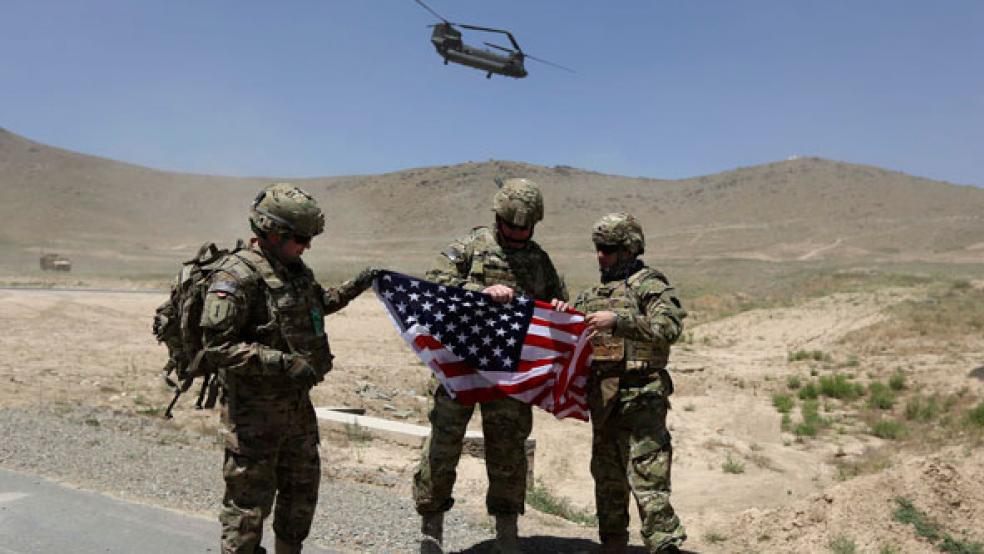The long-term security pact between Washington and Afghanistan is in danger of falling apart, with Afghan President Hamid Karzai demanding more concessions and seemingly determined to extend negotiations to April’s Afghan presidential election.
Now, experts are warning that the continued delay puts U.S. plans to withdraw the majority of its troops from the country within the coming year at risk.
Related: Hamid Karzai: From Afghan Hope to Afghan Villain
There has never been a peaceful transfer of power in Afghan history. U.S. planners were hopeful that this transfer would occur in the months after April’s election. But this is a troubling assumption, according to Michael Rubin of the American Enterprise Institute. The April election is only the start of the presidential race. It’s likely to last for months after that, keeping the Americans in country even longer.
“Even if the election is in April, that’s the first round [in Afghanistan],” Rubin said. “We may be talking about June or September before we know who the next president is.”
The entire election would be delayed, Rubin added, if one of the dozens of presidential candidates is assassinated before the contest. This might seem a distant possibility to most Americans – but political assassinations in Afghanistan are common.
Less than two months ago, the Taliban took the life of Logar Governor Arsala Jamal. Hanifa Safi, the provincial head of the Afghan ministry of women's affairs, was also killed last summer.
“If there’s an assassination of any candidate – and there are dozens of candidates from all over the country – then, by the Afghan constitution, it delays everything,” said Rubin. “If someone ‘offs’ that random guy from some far-flung province, everything gets put on hold.”
Related: This Unnoticed Law Could Cut Billions to Afghanistan
The latest delay in negotiations, combined with the prospect of election violence, underscores an uncomfortable truth for American politicians and military planners. Despite the Afghanistan war’s unpopularity, the planned withdrawal of the majority of American troops is at risk without a radical change in policy between now and next summer.
Right now, there are 68,000 U.S. troops in Afghanistan. Pentagon spokesperson Elissa Smith said that half of these troops would be removed by next February.
“As the president announced, we will withdraw to 34,000 U.S. troops in Afghanistan by February 2014. These troops have been and continue to be removed in a phased approach, managed by the commander on the ground and the military chain of command,” she said.
No decisions on long-term troop numbers, however, have been made.
“The [bilateral security agreement or BSA] does not address the number of U.S. forces that may be present in Afghanistan after 2014, nor does it commit us to have forces in Afghanistan,” said Smith. “The president has not yet made any decisions about how many U.S. troops to keep in Afghanistan after 2014, if the BSA is approved.”
If the timeline does shift, tens of thousands of American lives could remain at risk. It also means that tens of billions of dollars beyond what the U.S. had already planned to spend would be spent. This would occur despite the fact that the American people and politicians have long grown war-weary.
“The concern … is that the patience of the American Congress and the American people might be wearing thin,” said Austin Long, an assistant professor of international affairs at Columbia University.
Billions at Risk
The U.S. is expected to spend $32 billion in Afghanistan next year, according to official estimates. In earlier reports, The Fiscal Times estimated that the total savings of the so-called “zero option” – or pulling out of Afghanistan completely – would total $111 billion.
Yet the evolving negotiations over the long-term security deal changes the fiscal picture. Without significant policy changes, and as the security agreement remains unsigned, the size and scope of U.S. operations are impossible to estimate.
What’s clear however is that any prolonged deployment is going to be expensive. Right now, the Pentagon is spending $5.9 billion per month. At this rate, an additional year would cost $70.8 billion.
Policy Changes Afoot?
Right now, military planners, diplomats and politicians are trying to determine if this policy should change, according to Long. He said that Iraq provides important historic perspective. The 2006 midterm elections showed that the American public had grown tired of the war in Iraq. Politicians recognized this and adjusted policy accordingly, getting U.S. troops and money out of harm’s way by the end of that decade.
Now, the U.S. refuses to intervene with boots on the ground as Iraq descends into chaos. Diplomats, staff and military brass working in Afghanistan do not want the same thing to happen there, Long said.
“The folks in Afghanistan at the senior level don’t want it to come to that. We sunk so much into this. We can salvage something out of it with a minor commitment,” he said.
“The patience in D.C. is pretty thin, both in the executive and in the legislature,” Long added. “It’s a real possibility we may end up with a situation like Iraq.”
Top Reads from The Fiscal Times:
- Why Kerry’s Iran Deal Will Hold Up
- How Secret Global Trade Talks Can Destroy the Internet
- How a Leaner Military Could Save U.S. Defense





